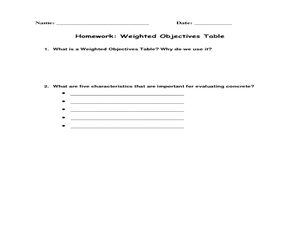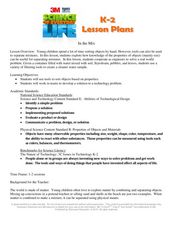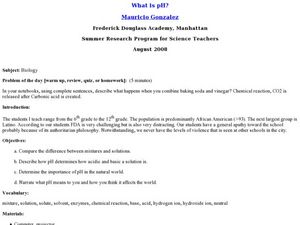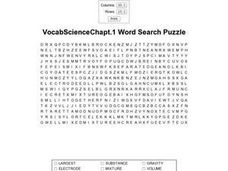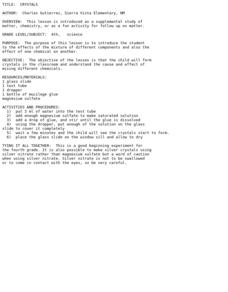Curated OER
Acids, Bases, and Buffers
In this acids and bases worksheet, students test the pH of different solutions to determine if it is basic or acidic. Students complete 7 short answer questions based on their results.
Curated OER
The Effect of Concentration Changes on Equilibrium
In this concentration changes and equilibrium worksheet, students experiment with iron (III) ions and thiocyanate ions to observe the effects of concentration on the equilibrium of solutions. Students make observations of their mixtures,...
Curated OER
Weighted Objectives Table and Optimum Mix Sheet
Young scholars analyze data and determine an appropriate concrete mixture. In this technical solutions lesson plan, students discuss weighted objectives, review sample scenarios, and rate concrete recipes to identify how well water...
Curated OER
Matter Overview
There is not much information in this presentation. It serves more as a guide to direct the flow of your introductory chemistry lecture. Each slide displays a large title and a smaller phrase meant to explain it. For example, one title...
Curated OER
Sore Throats, Variation 1
Why does Nia's water taste saltier than Trey's if she put more into her cup than he did? Math masters set up proportions in order to compare the mixtures. This task effectively has learners apply the concepts of ratio and proportion to a...
University of Georgia
What's So Special about Bottled Drinking Water?
Is artesian water designed to be better, or is it just from wells similar to those in the city of Artesium? This experiment looks at many different types of bottled waters, including artesian. Using a soap mixture, scholars test to see...
Curated OER
Lab: Percent of Composition of KClO3
Students find the percent of oxygen in potassium chlorate. In this percent composition lesson plan, students heat a solution of potassium chlorate using a catalyst, manganese dioxide, to decompose the potassium chlorate and release...
Aquarium of the Pacific
States of Matter: Making Ice Cream
Who knew that learning about the states of matter could taste so sweet? This fun hands-on lesson captures the attention of learners as they use what they know about solids, liquids, and gases to create their very own batch of ice cream.
American Chemical Society
Dissolving M-and-Ms
Learning ... how sweet it is! A hands-on lesson uses colored candies to demonstrate how positive and negative charges interact. Pupils use different types of liquids and watch as the color from the candies spreads—or doesn't.
Curated OER
Making Soap
In this soap worksheet, students produce soap in the laboratory and test their product by washing away engine oil with their soap. Students answer four questions about tests they perform on their soap.
Curated OER
In the Mix
Students construct a water filter. In this engineering lesson, students discover how to construct a water filtration system. Students work in groups to sort tools by their properties. Students analyze and construct a water filtration...
Curated OER
What is pH?
Students describe pH and the importance of it in the natural world. In this Biology lesson students compare the pH of different mixtures.
Curated OER
Vocab Science Chapter 1
In this word search worksheet, students locate 20 words related to science. The word list includes volume, mixture, and solute.
Curated OER
Crystals
Fourth graders use mucilage glue and magnesium sulfate to make crystals. They mix the ingredients, place a drop on a glass slide and observe the forming crystals.
Curated OER
Programming the "Rinse Robot"
Experienced chemistry technicians use then layer chromatography to discover how much of a free compound is left after each rinse cycle. Where this could obviously be used as a practice with chromatography technique, it can also be used...
Curated OER
Weighted Averages
Weighted averages can be tricky to explain! However, this study guide makes it easy for teachers by including definitions, explanations, and breaking down problems into three steps. Includes mixture problems and uniform motion problems.
Curated OER
Fatty Acids For Soap Making
High schoolers titrate a sample of fatty acids with standardized sodium hydroxide solution. From the amount of base needed for neutralization and the mass of sample used for titration, the apparent average molar mass of the sample is...
Curated OER
WS 8.4 Percentage Problems
In this percentage instructional activity, students calculate percentages given various types of problems. They calculate percent of compounds in a solution, they calculate mass of compounds given percentages of solutions, and they...
Curated OER
Water Quality and Environmental Pollution
Learners use litmus paper to begin to discover the qualities of acids and bases. They learn about pH by testing clear liquids for acidity with purple cabbage juice as an indicator. The video Streamkeeper, with Bill Nye, and other video...
Virginia Department of Education
Macromolecules
Finally, a chance for the class to play with their food! Allow pupils to simulate stomach acid with common foods, and introduce specific macromolecules into the mixture to explore characteristics of carbohydrates, lipids, and proteins....
EngageNY
Comparing Ratios Using Ratio Tables
Decide which concentration of mixtures is the strongest. Pupils use tables to compare ratios involved in mixtures. They use two methods to make the comparisons — by finding equivalent values within the tables or by comparing the values...
Teach Engineering
Surface Tension Lab
What constitutes a good soap bubble? In the second installment of a nine-part series, scholars apply their understanding of surface tension to soap bubbles. They experiment to determine the best solutions to use for the...
Sunlight Cal-Tech
Chromatography of Plant Pigments
Through a hands-on activity, an acetone-spinach solution is pre-made and learners use this solution to separate the pigments found in spinach using chromatography. The comprehensive resource includes an analysis and conclusion questions.
Curated OER
Matter And Its Changes
Fifth graders explore the phases of matter, make observations of matter, the physical and chemical properties of matter, solutions and mixtures, formation of molecules and atoms and molecules all through hands on activities.
Other popular searches
- Solutions and Mixtures
- Science Mixtures Solutions
- Compounds Mixtures Solutions
- Science Mixtures & Solutions
- Solutions Mixtures
- Science Mixtures and Solutions
- Mixtures Solutions Density




